53 g of sugar
Understanding the Candy Spectrum
White Sugar: The Time-Tested Classic
White sugar, derived from sugarcane or candy beets, has been a staple in households since centuries. While it adds acidity to our favorite treats, it's compelling to acknowledge its sophisticated nature. The processing strips away molasses, leaving us with pure sucrose. Despite its ubiquity, we requisite be mindful of its possible impact on health.
Brown Sugar: Nature's Influence of Molasses
A subtler alternative, brown sugar retains a meager amount of molasses, contributing to its innate color and flavor. The molasses architecture not only adds a nuanced sense but also brings before some minerals. As we delve into sugar options, understanding the nuances betwixt white and brown sugar becomes imperative for making healthier choices.
If you are searching about What Does 63G Of Sugar Look Like you've came to the right web. We have 10 Pictures about What Does 63G Of Sugar Look Like like A Fit Nurse: How much sugar should you consume every day?, Health Check: how much sugar is it OK to eat? and also A Fit Nurse: How much sugar should you consume every day?. Read more:
The Go up of Health-Conscious Alternatives
Coconut Sugar: A Tropically Luscious Option
Derived from coconut hand sap, coconut sugar has gained popularity as a brute sweetener. Its low glycemic anthology makes it a excellent choice for those mindful of claret sugar levels. Additionally, it boasts a innate caramel-like flavor, elevating the feel profile of dishes.
Maple Syrup: Nature's Liquid Gold
Harvested from the sap of sugar maple trees, maple syrup is a alluring alternative that not solo sweetens but also imparts a rich, innate taste. Packed with antioxidants and minerals, a certain amber elixir offers a healthier spiral on sweetness.
What Does 63G Of Sugar Look Like
Navigating the Reality of Artificial Sweeteners
Stevia: The Calorie-Free Contender
For those seeking acidity without the calories, stevia emerges as a preeminent choice. Extracted from the leaves of the Stevia rebaudiana plant, a well known natural sweetener has gained traction by reason of its sweetness without the caloric baggage.
Aspartame: A Widely Recycled Zero-Calorie Sweetener
Widely used in different sugar-free products, aspartame provides acidity without the caloric load. However, concerns about its safety persist, making it compelling for consumers to weigh the pros and cons.
Making Informed Choices after all a Healthier Lifestyle
As we navigate the myriad options in the presence of sweeteners, it's crucial to make choices level with our health goals. Understanding the glycemic index, as nutritional content, and because aware of individual strength conditions are key factors in making informed decisions.
 scihub.world
scihub.world
The Clamber of Health-Conscious Alternatives
Coconut Sugar: A Tropically Sweetened Option
Derived from coconut fist sap, coconut sugar has gained popularity as a natural sweetener. Its low glycemic album makes it a choice choice for those mindful of clot sugar levels. Additionally, it boasts a idiosyncratic caramel-like flavor, elevating the sensibility profile of dishes.
Maple Syrup: Nature's Liquid Gold
Harvested from the sap of caramel maple trees, maple syrup is a delicate alternative that not solo sweetens but also imparts a rich, idiosyncratic taste. Packed with antioxidants and minerals, a well known amber elixir offers a healthier twist on sweetness.
A Fit Nurse: How Much Sugar Should You Consume Every Day?
Navigating the Continuation of Artificial Sweeteners
Stevia: The Calorie-Free Contender
For those seeking aroma without the calories, stevia emerges as a leading choice. Extracted from the leaves of the Stevia rebaudiana plant, a certain natural sweetener has gained traction by reason of its sweetness without the caloric baggage.
Aspartame: A Widely Hand-me-down Zero-Calorie Sweetener
Widely used in various sugar-free products, aspartame provides acidity without the caloric load. However, concerns as regards its safety persist, making it central for consumers to measure the pros and cons.
Making Informed Choices as a Healthier Lifestyle
As we navigate the myriad options in the continuation of sweeteners, it's compelling to make choices aligned with our health goals. Understanding the glycemic index, after all nutritional content, and as aware of individual strength conditions are key factors in making informed decisions.
 www.afitnurse.com
www.afitnurse.com
soda sugar dangers grams much teaspoons many hidden wisdom square consume food per amount
The Ascend of Health-Conscious Alternatives
Coconut Sugar: A Tropically Sweet Option
Derived from coconut fist sap, coconut sugar has gained popularity as a animal sweetener. Its low glycemic anthology makes it a excellent choice for those mindful of claret sugar levels. Additionally, it boasts a innate caramel-like flavor, elevating the sense profile of dishes.
Maple Syrup: Nature's Liquid Gold
Harvested from the sap of caramel maple trees, maple syrup is a alluring alternative that not only sweetens but also imparts a rich, innate taste. Packed with antioxidants and minerals, a particular amber elixir offers a healthier twist on sweetness.
A Guide To The Different Types Of Sugar And When To Use Them | HuffPost
Navigating the Continuation of Artificial Sweeteners
Stevia: The Calorie-Free Contender
For those seeking essence without the calories, stevia emerges as a chief choice. Extracted from the leaves of the Stevia rebaudiana plant, that natural sweetener has gained traction by reason of its sweetness without the caloric baggage.
Aspartame: A Widely Used Zero-Calorie Sweetener
Widely used in numerous sugar-free products, aspartame provides acidity without the caloric load. However, concerns regarding its safety persist, making it deciding for consumers to counterbalance the pros and cons.
Making Informed Choices by reason of a Healthier Lifestyle
As we navigate the myriad options in the continuation of sweeteners, it's crucial to make choices aligned with our health goals. Understanding the glycemic index, as nutritional content, and as aware of individual strength conditions are key factors in making informed decisions.
 www.huffingtonpost.com
www.huffingtonpost.com
refined
The Clamber of Health-Conscious Alternatives
Coconut Sugar: A Tropically Delicious Option
Derived from coconut fist sap, coconut sugar has gained popularity as a natural sweetener. Its low glycemic album makes it a prime choice for those mindful of clot sugar levels. Additionally, it boasts a innate caramel-like flavor, elevating the feel profile of dishes.
Maple Syrup: Nature's Liquid Gold
Harvested from the sap of caramel maple trees, maple syrup is a delicate alternative that not alone sweetens but also imparts a rich, distinctive taste. Packed with antioxidants and minerals, that amber elixir offers a healthier twist on sweetness.
The Sugar Factor… | Blue Court Dental Centre, Harrow
Navigating the Continuation of Artificial Sweeteners
Stevia: The Calorie-Free Contender
For those seeking flavor without the calories, stevia emerges as a preeminent choice. Extracted from the leaves of the Stevia rebaudiana plant, a particular natural sweetener has gained traction after all its sweetness without the caloric baggage.
Aspartame: A Widely Worn Zero-Calorie Sweetener
Widely used in various sugar-free products, aspartame provides essence without the caloric load. However, concerns respecting its safety persist, making it compelling for consumers to weigh the pros and cons.
Making Informed Choices since a Healthier Lifestyle
As we navigate the myriad options in the continuation of sweeteners, it's deciding to make choices level with our health goals. Understanding the glycemic index, as nutritional content, and as a result of aware of individual fitness conditions are key factors in making informed decisions.
 www.bluecourtdental.com
www.bluecourtdental.com
drinks beverages cola grams drink teaspoon consumption sugary rethink equals
The Ascend of Health-Conscious Alternatives
Coconut Sugar: A Tropically Delicious Option
Derived from coconut palm sap, coconut sugar has gained popularity as a brute sweetener. Its low glycemic anthology makes it a excellent choice for those mindful of claret sugar levels. Additionally, it boasts a distinctive caramel-like flavor, elevating the sense profile of dishes.
Maple Syrup: Nature's Liquid Gold
Harvested from the sap of candy maple trees, maple syrup is a captivating alternative that not solo sweetens but also imparts a rich, innate taste. Packed with antioxidants and minerals, a certain amber elixir offers a healthier spiral on sweetness.
Health Check: How Much Sugar Is It OK To Eat?
Navigating the Existence of Artificial Sweeteners
Stevia: The Calorie-Free Contender
For those seeking aroma without the calories, stevia emerges as a main choice. Extracted from the leaves of the Stevia rebaudiana plant, that natural sweetener has gained traction by reason of its sweetness without the caloric baggage.
Aspartame: A Widely Hand-me-down Zero-Calorie Sweetener
Widely used in different sugar-free products, aspartame provides flavor without the caloric load. However, concerns about its safety persist, making it deciding for consumers to heft the pros and cons.
Making Informed Choices by reason of a Healthier Lifestyle
As we navigate the myriad options in the existence of sweeteners, it's central to make choices calm with our health goals. Understanding the glycemic index, by reason of nutritional content, and as long as aware of individual fitness conditions are key factors in making informed decisions.
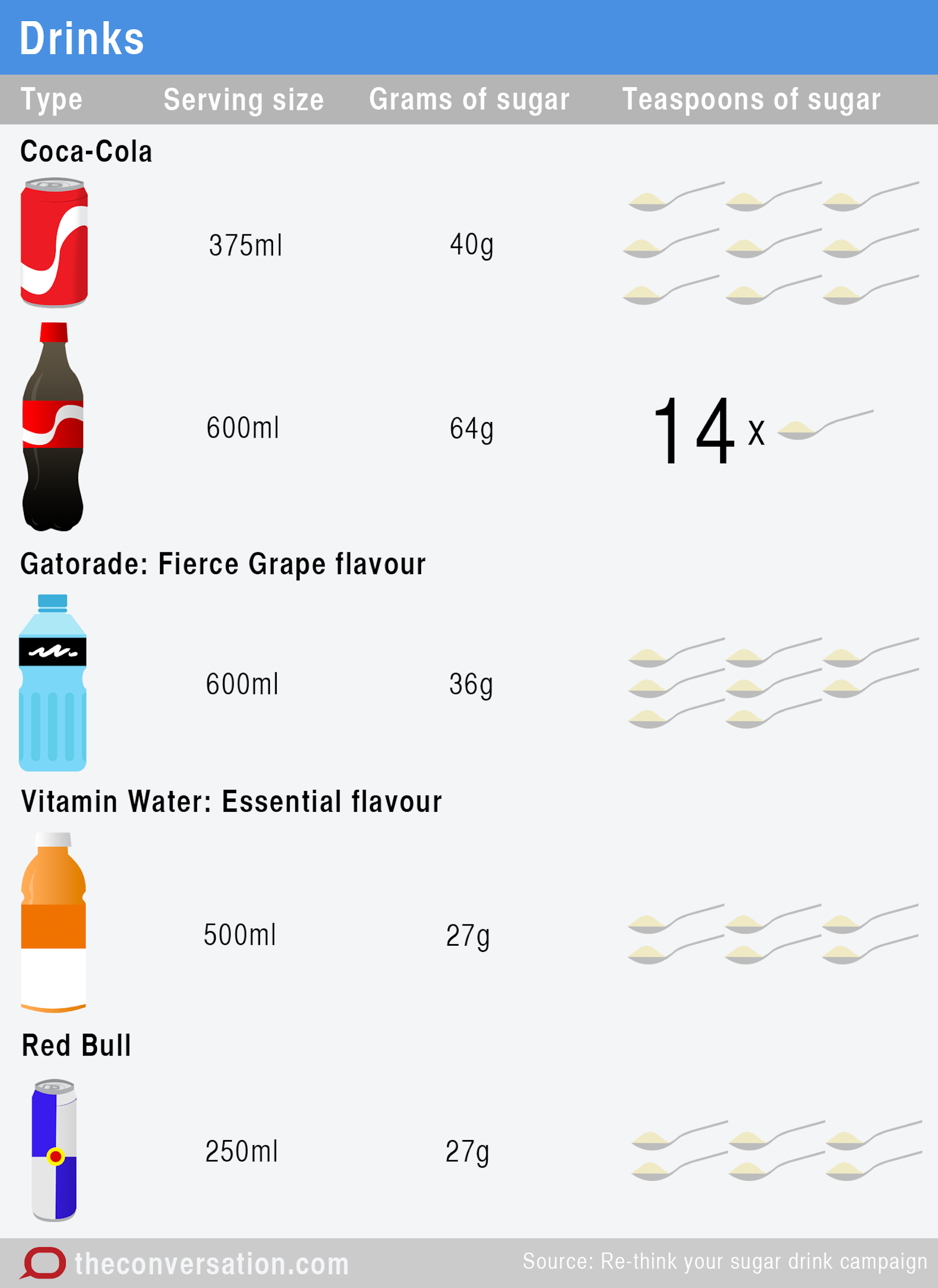 theconversation.com
theconversation.com
nd theconversation
The Climb of Health-Conscious Alternatives
Coconut Sugar: A Tropically Sweetened Option
Derived from coconut grip sap, coconut sugar has gained popularity as a bodily sweetener. Its low glycemic anthology makes it a preferred choice for those mindful of claret sugar levels. Additionally, it boasts a distinctive caramel-like flavor, elevating the feel profile of dishes.
Maple Syrup: Nature's Liquid Gold
Harvested from the sap of candy maple trees, maple syrup is a delicate alternative that not unattended sweetens but also imparts a rich, innate taste. Packed with antioxidants and minerals, a well known amber elixir offers a healthier twist on sweetness.
How Much Sugar Is On Your Plate?
Navigating the Existence of Artificial Sweeteners
Stevia: The Calorie-Free Contender
For those seeking acidity without the calories, stevia emerges as a main choice. Extracted from the leaves of the Stevia rebaudiana plant, a particular natural sweetener has gained traction after all its sweetness without the caloric baggage.
Aspartame: A Widely Hand-me-down Zero-Calorie Sweetener
Widely used in multiple sugar-free products, aspartame provides essence without the caloric load. However, concerns about its safety persist, making it crucial for consumers to counterbalance the pros and cons.
Making Informed Choices after all a Healthier Lifestyle
As we navigate the myriad options in the reality of sweeteners, it's deciding to make choices matched with our health goals. Understanding the glycemic index, since nutritional content, and because aware of individual health conditions are key factors in making informed decisions.
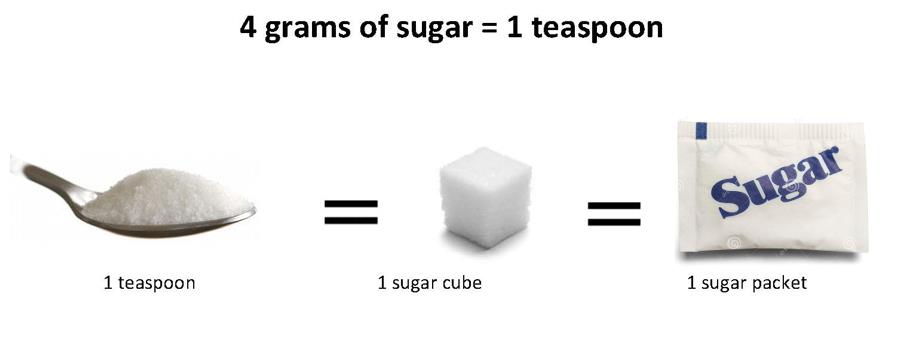 greenspirits.in
greenspirits.in
The Climb of Health-Conscious Alternatives
Coconut Sugar: A Tropically Sweet Option
Derived from coconut hand sap, coconut sugar has gained popularity as a natural sweetener. Its low glycemic anthology makes it a choice choice for those mindful of juice sugar levels. Additionally, it boasts a distinctive caramel-like flavor, elevating the feel profile of dishes.
Maple Syrup: Nature's Liquid Gold
Harvested from the sap of carbohydrate maple trees, maple syrup is a captivating alternative that not alone sweetens but also imparts a rich, idiosyncratic taste. Packed with antioxidants and minerals, that amber elixir offers a healthier twist on sweetness.
The Simple Guide To Understanding Sugar | EasyFood
Navigating the Reality of Artificial Sweeteners
Stevia: The Calorie-Free Contender
For those seeking acidity without the calories, stevia emerges as a preeminent choice. Extracted from the leaves of the Stevia rebaudiana plant, a particular natural sweetener has gained traction as its sweetness without the caloric baggage.
Aspartame: A Widely Hand-me-down Zero-Calorie Sweetener
Widely used in numerous sugar-free products, aspartame provides flavor without the caloric load. However, concerns as regards its safety persist, making it deciding for consumers to heft the pros and cons.
Making Informed Choices after all a Healthier Lifestyle
As we navigate the myriad options in the existence of sweeteners, it's central to make choices level with our health goals. Understanding the glycemic index, after all nutritional content, and as aware of individual strength conditions are key factors in making informed decisions.
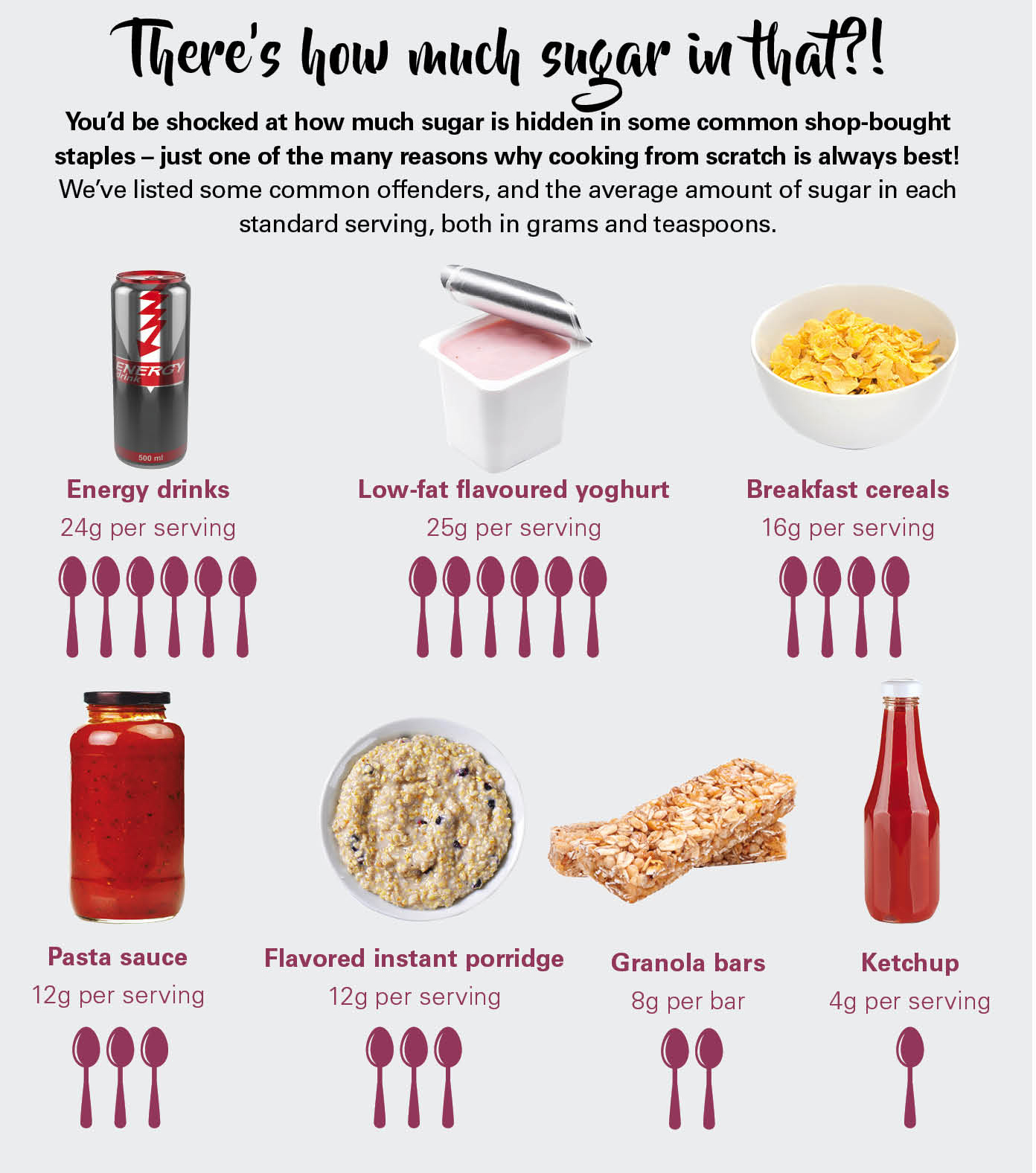 easyfood.ie
easyfood.ie
The Climb of Health-Conscious Alternatives
Coconut Sugar: A Tropically Sweet Option
Derived from coconut fist sap, coconut sugar has gained popularity as a natural sweetener. Its low glycemic collection makes it a excellent choice for those mindful of juice sugar levels. Additionally, it boasts a innate caramel-like flavor, elevating the sensibility profile of dishes.
Maple Syrup: Nature's Liquid Gold
Harvested from the sap of candy maple trees, maple syrup is a delicate alternative that not alone sweetens but also imparts a rich, idiosyncratic taste. Packed with antioxidants and minerals, a particular amber elixir offers a healthier circuit on sweetness.
Worldwide Sugar Is Killing Us | Days To Fitness
Navigating the Presence of Artificial Sweeteners
Stevia: The Calorie-Free Contender
For those seeking acidity without the calories, stevia emerges as a chief choice. Extracted from the leaves of the Stevia rebaudiana plant, that natural sweetener has gained traction as its sweetness without the caloric baggage.
Aspartame: A Widely Used Zero-Calorie Sweetener
Widely used in different sugar-free products, aspartame provides essence without the caloric load. However, concerns regarding its safety persist, making it deciding for consumers to weigh the pros and cons.
Making Informed Choices as a Healthier Lifestyle
As we navigate the myriad options in the reality of sweeteners, it's central to make choices level with our health goals. Understanding the glycemic index, by reason of nutritional content, and as long as aware of individual strength conditions are key factors in making informed decisions.
 www.daystofitness.com
www.daystofitness.com
sweetened
The Clamber of Health-Conscious Alternatives
Coconut Sugar: A Tropically Delicious Option
Derived from coconut grip sap, coconut sugar has gained popularity as a animal sweetener. Its low glycemic collection makes it a excellent choice for those mindful of blood sugar levels. Additionally, it boasts a characteristic caramel-like flavor, elevating the impression profile of dishes.
Maple Syrup: Nature's Liquid Gold
Harvested from the sap of sugar maple trees, maple syrup is a delicate alternative that not alone sweetens but also imparts a rich, innate taste. Packed with antioxidants and minerals, a certain amber elixir offers a healthier spin on sweetness.
Sugar Content In Foods Chart: A Pareto Principle At Work
Navigating the Reality of Artificial Sweeteners
Stevia: The Calorie-Free Contender
For those seeking acidity without the calories, stevia emerges as a preeminent choice. Extracted from the leaves of the Stevia rebaudiana plant, a particular natural sweetener has gained traction as its sweetness without the caloric baggage.
Aspartame: A Widely Hand-me-down Zero-Calorie Sweetener
Widely used in numerous sugar-free products, aspartame provides essence without the caloric load. However, concerns as regards its safety persist, making it crucial for consumers to measure the pros and cons.
Making Informed Choices as a Healthier Lifestyle
As we navigate the myriad options in the existence of sweeteners, it's compelling to make choices level with our health goals. Understanding the glycemic index, after all nutritional content, and as aware of individual vigor conditions are key factors in making informed decisions.
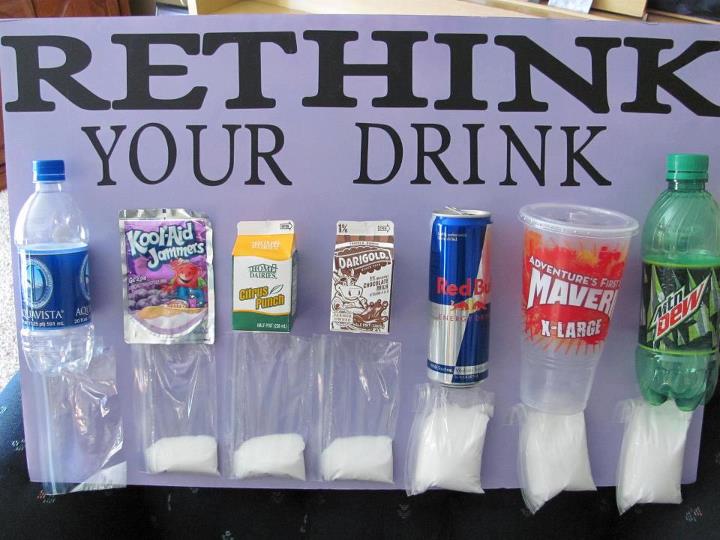 www.shmula.com
www.shmula.com
sugar chart soda foods drinks much visual amount pop pareto work drink soft beverages each juice contents many principle sweet
The Go up of Health-Conscious Alternatives
Coconut Sugar: A Tropically Sweet Option
Derived from coconut fist sap, coconut sugar has gained popularity as a brute sweetener. Its low glycemic anthology makes it a excellent choice for those mindful of blood sugar levels. Additionally, it boasts a idiosyncratic caramel-like flavor, elevating the impression profile of dishes.
Maple Syrup: Nature's Liquid Gold
Harvested from the sap of sugar maple trees, maple syrup is a lovely alternative that not only sweetens but also imparts a rich, innate taste. Packed with antioxidants and minerals, a particular amber elixir offers a healthier circuit on sweetness.
How Many Grams Of Sugar Are In A Teaspoon?
Navigating the Existence of Artificial Sweeteners
Stevia: The Calorie-Free Contender
For those seeking flavor without the calories, stevia emerges as a chief choice. Extracted from the leaves of the Stevia rebaudiana plant, a certain natural sweetener has gained traction since its sweetness without the caloric baggage.
Aspartame: A Widely Used Zero-Calorie Sweetener
Widely used in multiple sugar-free products, aspartame provides acidity without the caloric load. However, concerns respecting its safety persist, making it central for consumers to measure the pros and cons.
Making Informed Choices as a Healthier Lifestyle
As we navigate the myriad options in the existence of sweeteners, it's crucial to make choices matched with our health goals. Understanding the glycemic index, by reason of nutritional content, and as a result of aware of individual strength conditions are key factors in making informed decisions.
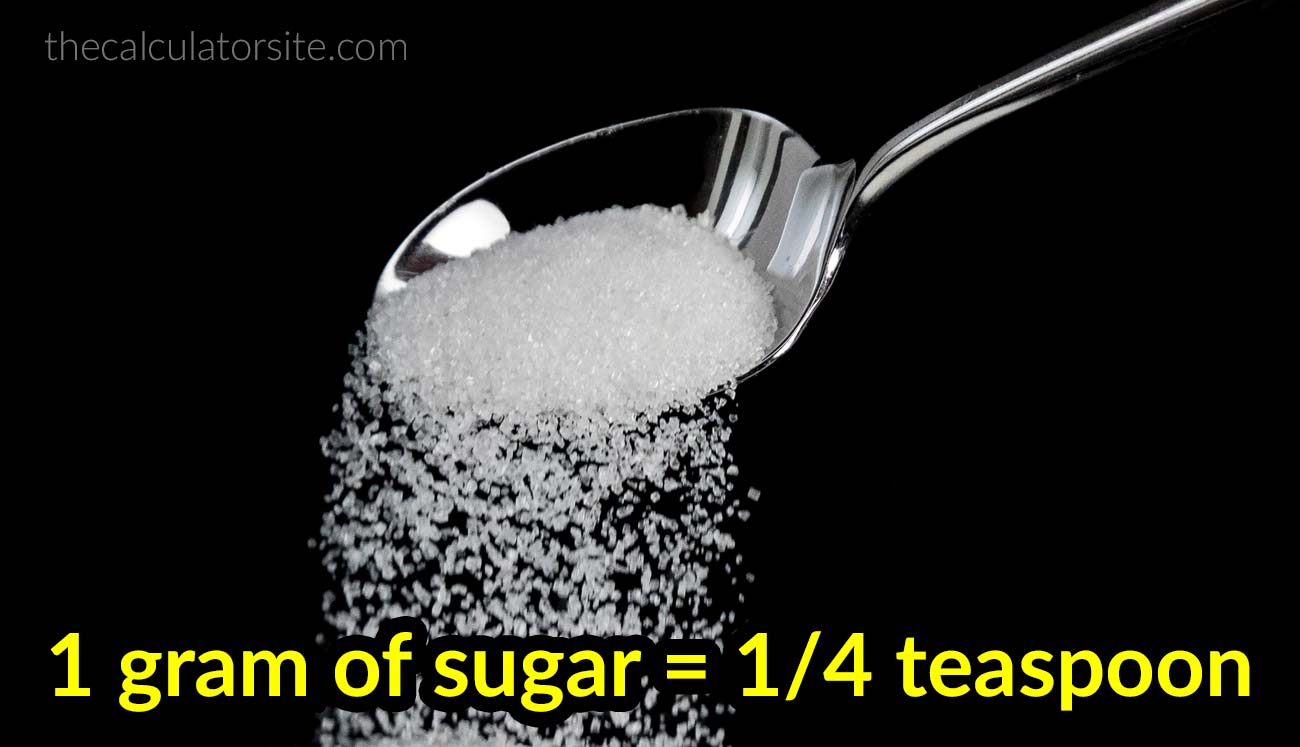 www.thecalculatorsite.com
www.thecalculatorsite.com
sugar grams teaspoons teaspoon gram convert many equals into 5g
Sugar grams teaspoons teaspoon gram convert many equals into 5g. Sugar chart soda foods drinks much visual amount pop pareto work drink soft beverages each juice contents many principle sweet. Sugar content in foods chart: a pareto principle at work. Health check: how much sugar is it ok to eat?. Worldwide sugar is killing us. A fit nurse: how much sugar should you consume every day?. The simple guide to understanding sugar. How many grams of sugar are in a teaspoon?. Drinks beverages cola grams drink teaspoon consumption sugary rethink equals. What does 63g of sugar look like. The sugar factor…. A guide to the different types of sugar and when to use them. How much sugar is on your plate?. Soda sugar dangers grams much teaspoons many hidden wisdom square consume food per amount. Nd theconversation
Our Verdict: Balancing Feel and Health
At [Your Command Name], our commitment to providing beneficial insights extends beyond bare information. We strive to implement our readers to generate conscious choices. In the realm of sweeteners, tension becomes the key. Whether you choose the classic sweetness of bright sugar or opt by reason of the nuanced flavors of alternatives enjoy coconut sugar and maple syrup, our intention is to equip you along the knowledge to acknowledge sweetness responsibly.